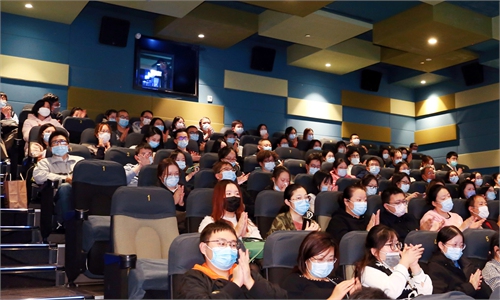ARTS / CULTURE & LEISURE
As another well-known cinema closes, moviegoers still have hope for future

Staff members disinfect a cinema in Harbin, northeast China's Heilongjiang Province, Nov. 18, 2021. Harbin terminated its emergency responses to COVID-19 on Thursday and started advancing the full restoration of the normal economic and social order after the recent resurgence of COVID-19 has been subdued. Photo: Xinhua
The weather has been getting warmer in April but for most cinemas a chill wind is still blowing, partly due to the pandemic but also because of the growing popularity of online video platforms.
On April 18, news of the demise of a popular cinema in Chaoyang District in Beijing went viral on social media, one of the cinema's staff members surnamed Dong told the Global Times.
"The last time I went there was in January. They had to stop the heating and provided blankets to keep us warm inside the theaters," a moviegoer surnamed Zhu recalled about the now-closed cinema.
For many moviegoers in China, it's not surprising to see cinemas closing as there have been signs for some time of difficulties in the industry.
In March, the domestic movie box office was only 913 million yuan ($143 million), a decrease of 63.5 percent compared to the year before. At the same time, due to the insufficient supply of new movies, the operating rate of cinemas continued to decline, and more than half of the theaters nationwide were temporarily closed.
By Sunday, China had a total of 5,493 operating cinemas, accounting for 45.6 percent of all national theaters, according to Beacon, a Chinese ticketing platform under Ali Pictures.
Among the cinemas that are still struggling, one in Zhengzhou, Central China's Henan Province has sometimes held screenings with only one viewer, a staff member surnamed Liu told the Global Times.
Mixed feelings
As well as the epidemic, the rise of online video platforms in the past three years has also put pressure on cinemas. It's the same globally, with the popularity of platforms like Netflix and Apple+, and in China domestic streaming companies are booming. The quality of the product and the fact that new movies are directly available online has seen society gradually adapting to the streaming media model.
In 2020, action star Donnie Yen's Enter the Fat Dragon set an example by having its PVoD (premium video on demand) release on iQIYI. The company told the Global Times that a total of 33 movies produced by iQIYI have been released since 2021.
Other video platforms are also pushing for more movie rights for the audience.
For 26-year-old Zixian, she hasn't gone to the cinema "for over three years since COVID-19 began at the end of 2019." For her, the expensive movie tickets and low expectations for new movies have kept her away from the cinema. This will continue, she said, "as long as the video platforms continue to provide online movies."
Hope for the future?
However, many industry insiders and moviegoers still have a positive view, believing that cinemas are a symbol within society and that their fortunes will revive as long as there are enough viewers and fans of cinema.
In July 2020, after cinemas were closed for over half a year in Nanjing, East China's Jiangsu Province, a 25-year-old fan surnamed Li rushed to the reopened cinema to watch A First Farewell. Li told The Paper that he and his girlfriend had watched over 70 movies at home while the cinemas had been closed across the city.
Meanwhile, business insiders also believe there is still hope for the future of cinemas.
Xiao Fuqiu, a film critic based in Shanghai, told the Global Times on Monday that compared with media giants like Netflix, HBO Max and Amazon Prime Video, domestic streaming companies have not fully utilized the impact of the epidemic to expand their territory.
"I don't think the Chinese online streaming platforms have caused a threat to the survival and development of cinemas. Instead, I think the two platforms are complementary to each other," Xiao said.
Zhang Peng, a film researcher at Nanjing University's National Research Center of Cultural Industries, said that some online dramas and variety shows are the main target of the Chinese streaming platforms, and they usually stream films with smaller budgets. Most of the blockbusters are not likely to choose streaming directly, Zhang said.
"If video platforms have ushered in the spring of streaming films, it is actually a sadness for the Chinese film industry," Zhang added.



